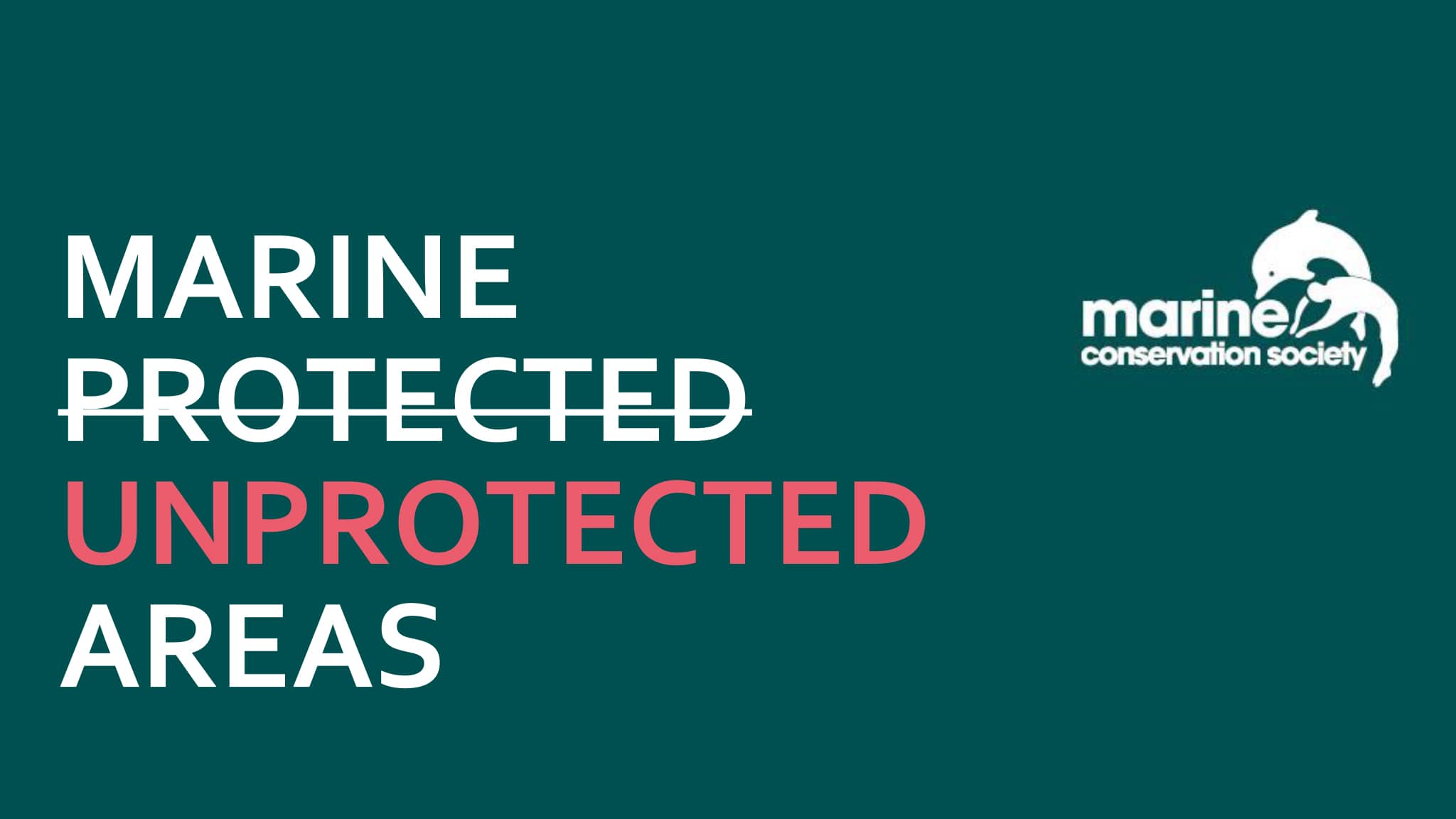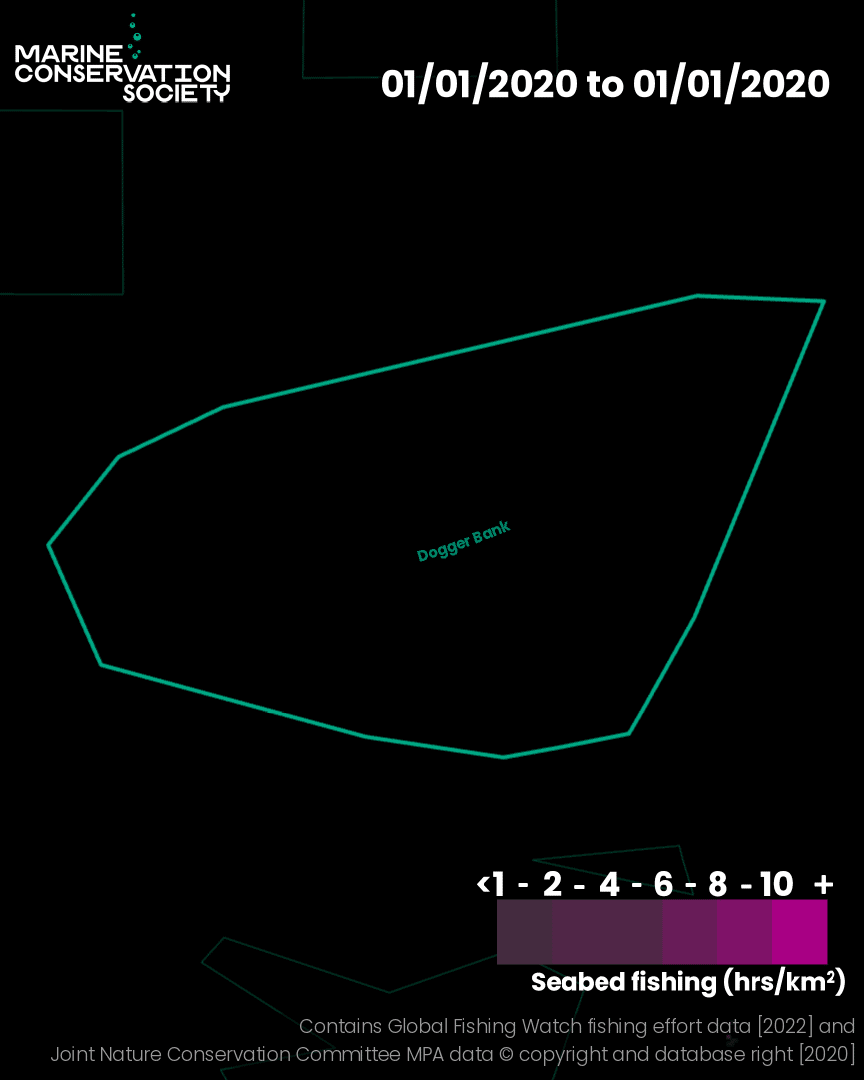Marine Life & Conservation
Marine unProtected Areas: UK’s damaged seas still missing crucial protection

 Broken promises by UK Government leaves England’s seabed MPAs at risk
Broken promises by UK Government leaves England’s seabed MPAs at risk
- Over 5,000 hours of fishing in Dogger Bank MPA in the last year
- 10 Minute Rule on bottom-trawling in MPAs on 1st March by Chris Grayling MP
The Marine Conservation Society’s analysis of fishing activity in Marine Protected Areas over the last year highlights the urgent need for protection of England’s seas in more than name.
A slew of broken promises and delayed actions are putting our seas at risk as damaging fishing continues to degrade England’s fragile seabed habitats.
The Marine Conservation Society is calling for the public’s support in banning damaging fishing, like bottom trawling, from England’s offshore MPAs designed to protect the seabed.
On 1st February 2021, the Marine Management Organisation (MMO) launched a public consultation on a proposed byelaw. This byelaw would protect the Dogger Bank Marine Protected Area (MPA), alongside three other sites, from bottom-towed fishing gear. Usually these are passed within 12 months by the Secretary of State. Yet over one year later, no management measures have been put in place.
Dr Jean-Luc Solandt, Principal Specialist in MPAs at the Marine Conservation Society said: “There is no sign of the promised timetable to ensure management for England’s entire list of 40 offshore MPAs. At current rates, it will take over a decade to get management in place. MPAs are currently a lie. For the sake of humanity, society, climate, food security, clean waters and indeed the law – we need action immediately.”
On 1st March 2022, Chris Grayling MP will raise a 10 Minute Rule motion in Parliament calling for fast-paced action from Government. Grayling will propose a bill to ban bottom trawling in MPAs, except for in exceptional circumstances, within 12 months.
The 10 Minute Rule illustrates support within the Conservative party and beyond for action on Marine Protected Areas. But while further delays are faced, damaging fishing activities, like bottom trawling, continue to degrade fragile seabed habitats.
The Marine Conservation Society’s analysis of fishing activity in Dogger Bank over the last year found fishing activity, like bottom trawling, had increased fivefold compared to historical rates. While the site’s protection was being discussed, it was in fact even more exploited.
Dogger Bank MPA has the capacity to store the most carbon of all English MPAs – equivalent to 2.5 million return trips from London to Sydney.
While bottom-towed fishing gear is still permitted in sites like Dogger Bank, more carbon is released from the seabed into the ocean, reducing its ability to buffer the effects of climate change. Since 1st February 2021, Dogger Bank has experienced 5,055 hours* of fishing, including bottom trawling.
Located about 120 kilometres east of Hull, Dogger Bank has been heavily fished for decades. Authorities first recognised the need for better protections in 2011, but failed to act.
Frith Dunkley, MPA Researcher at the Marine Conservation Society said: “In the year since this byelaw banning bottom-towed fishing gear from Dogger Bank MPA was proposed, the sandbank habitat and the species it was designated to protect have continued to be damaged by fishing activity, degrading marine life and removing ecologically important species such as sandeels.
“At 5 times the size of the Lake District National Park, Dogger Bank could be the first large offshore Marine Protected Area in England where a ban on damaging fishing methods is put in place. Mussels, oysters, fish, seabirds, whales, dolphins, seals and more would all benefit from the proposed management measures. It’s time for them to actually be put into action!”
Dr Solandt said: “Government inaction on marine protection goes beyond Dogger Bank. As of late 2021, just 6% of England’s Marine Protected Areas, designated to protect the seabed, are legally protected from damaging fishing activity, like bottom trawling. There have been countless international commitments to deliver well-managed protected areas across Europe since 2010. But here we are, 12 years on, with little to show for it.”
To read the Marine Conservation Society’s 2021 Marine unProtected Areas report, and learn more about fishing in Marine Protected Areas, please visit the charity’s website.
Marine Life & Conservation
Paul Watson Released as Denmark Blocks Japan’s Extradition Bid

Renowned anti-whaling activist Paul Watson has been released from custody in Greenland after spending five months in detention. Denmark’s Justice Ministry rejected Japan’s request for his extradition, citing insufficient guarantees that his time already served in custody would be credited against any potential sentence.
The 74-year-old Canadian-American was arrested on July 21 in Nuuk, Greenland’s capital, when his ship docked to refuel. His arrest was based on a 2012 Japanese warrant related to a 2010 encounter in Antarctic waters. Japan alleged Watson obstructed operations and caused damage to a whaling research ship during efforts to disrupt illegal whaling. Watson has consistently denied these claims, maintaining his commitment to marine conservation.
Denmark, which oversees extradition matters for Greenland, concluded that while the legal conditions for extradition were met, the lack of assurances from Japan regarding time-served credit made extradition untenable.
In a video shared by his foundation, Watson expressed gratitude and relief, saying, “After five months, it’s good to be out… and good to know they’re not sending me to Japan.” He added that the most difficult part of his time in custody was being separated from his two young sons.
Watson is a pioneering figure in marine conservation, known for founding the Captain Paul Watson Foundation in 2022 after decades of activism with the Sea Shepherd Conservation Society. His bold efforts to defend marine life have earned him widespread support, including from celebrities and conservationists. His work has also been featured in the acclaimed reality TV series Whale Wars.
Watson’s lawyer, Jonas Christoffersen, praised the decision, stating, “We are happy and relieved that Paul Watson is now free.” He added that Watson is eager to reunite with his family and continue his vital work.
The arrest occurred while Watson’s vessel, the M/Y John Paul DeJoria, was en route to the North Pacific with a team of 26 volunteers to intercept a Japanese whaling ship. His foundation described the arrest as politically motivated and emphasized that Watson’s actions were focused on ending illegal whaling practices.
Japan resumed commercial whaling in 2019 after leaving the International Whaling Commission, asserting that whale meat is a cultural tradition. Conservationists, however, continue to challenge these practices, highlighting their impact on marine ecosystems.
Despite the challenges, Watson remains steadfast in his mission to protect marine life and bring attention to whaling practices. His dedication to ocean conservation has made him a globally respected advocate for the environment.
Marine Life & Conservation
12 Days of Zero-Waste Fish-mas

This holiday period, the Marine Conservation Society, the UK’s leading ocean membership charity, invites you to make some simple changes to eating fish this Christmas to help our seas.
Dr Kenneth Bodles, Head of Fisheries and Aquaculture at the Marine Conservation Society, said, “During the festive season, our consumption increases, but so does waste. Sustainability isn’t just about where food comes from – it’s also about how you use it. By reducing waste and making the most out of your seafood, you’re not only taking steps to be more ocean-friendly, but can also help to cut costs during what is often one of the most expensive times of the year”.
The Marine Conservation Society has compiled twelve tips on how to consume seafood sustainably with zero-waste this Christmas:
Buy whole fish instead of fillets
Instead of fillets, consider buying whole fish such as salmon, hake, or lemon sole. By adopting a “nose to tail” approach with cooking, whole-baked fish not only feeds a crowd, but also helps to minimise waste and maximise sustainability by using up every part of the animal, including bones, skin, and fat.
Make fish stock
Leftover fish bones or shells can be put to good use by boiling them to make a nourishing fish stock or bisque. This can be frozen and preserved for later use and makes for a flavourful base in a soup.
Make your own fish pâté
Avoid waste by turning leftover fish, such as smoked mackerel or salmon, into a delicious pâté by blending with cream cheese and lemon. Perfect when paired with crackers.
The sustainability of salmon and mackerel varies depending on where and how it is caught or farmed. For more information on green-rated options, check the charity’s Good Fish Guide.
Buy frozen
By purchasing seafood that is frozen or vacuum-packed, this helps to reduce waste by extending the shelf life of your food.
Fish pie
If you’re wondering what to do with leftover cooked fish, why not opt for a classic fish pie with mashed potatoes, leeks, and a cheesy sauce? A sure crowd pleaser on Boxing Day.
Use the head
Don’t forget the fish head! The meat is incredibly tender and flavourful. The charity recommends a cod’s head curry or recreating Fallow’s renowned cod’s head in siracha butter.
By stretching your ingredients further, not only is this a more sustainable way to enjoy seafood, but also cost-effective by repurposing leftovers and cooking creatively.
Boxing Day brunch
Mix leftover kippers or smoked salmon with scrambled eggs for a tasty, zero-waste, Boxing Day brunch.
For best choice, make sure you buy kippers, or herring, from the North Sea and the North Irish Sea.
Zero-waste storage
A top tip from the Marine Conservation Society to avoid waste is freezing fish offcuts to save for future use.
Crisp up the skin
Even leftover fish skin can be turned into a quick savoury snack by crisping it up in an air fryer with a little olive oil and salt.
Anchovies two ways
Leftover anchovies can either be blended with butter to make a delicious anchovy butter or tossed into pasta for a hit of umami flavour.
The charity recommends opting for anchovies caught in the Bay of Biscay for best choice.
Fishcakes
For an easy, zero-waste meal, leftover seafood trimmings can be mixed with mash and fried in breadcrumbs to make fishcakes.
Pickled mussels
Try pickling mussels in 1:1 vinegar and water, with a dash of sugar for a sustainable, zero-waste snack that can be enjoyed well beyond the festive season.
Mussels farmed in the UK are a seafood superhero. Grown using low-impact methods and harvested by hand, they get all the food they need from the sea around them. This makes them one of the most sustainable, ocean-friendly, and cost-effective seafood options.
Players of People’s Postcode Lottery have raised £6.6M towards the Marine Conservation Society’s vital work in making seafood more sustainable.
Laura Chow, Head of Charities at People’s Postcode Lottery, said: “Fish is a festive favourite for many, but making sustainable choices when it comes to how we buy and eat seafood makes all the difference for our ocean. Support from players of People’s Postcode Lottery has helped the Marine Conservation Society further its sustainable seafood work, so that we can all enjoy healthier, better protected seas.”
The Marine Conservation Society encourages you to make sustainable seafood choices a year-round habit, not just for Christmas. To check how sustainable the seafood on your plate is, you can visit the charity’s Good Fish Guide. The Guide helps consumers and businesses identify the most sustainable seafood using a simple traffic light system, based on where and how species are caught or farmed. Green is the best choice, amber means improvements are needed, and red indicates fish to avoid buying.
Zero-waste gift idea
Why not embrace a zero-waste Christmas by gifting a membership to support marine conservation? It’s a meaningful, low-waste gift that helps protect our ocean for generations to come. Memberships start from as little as £5 a month – the price of a sandwich and drink from your local coffee shop.
Find the latest sustainable seafood advice for wild-caught and farmed seafood on the Good Fish Guide, downloadable to your phone from www.mcsuk.org/goodfishguide.
-

 News2 months ago
News2 months agoIconic SS United States to become the World’s Largest Artificial Reef
-

 News3 months ago
News3 months agoBook Review – 52 Assignments: Underwater Photography
-

 Gear News3 months ago
Gear News3 months agoDYNAMICNORD – New German diving brand enters the British market
-

 News3 months ago
News3 months agoExploring Cenote El Pit: A Diver’s Dream
-

 Gear News3 months ago
Gear News3 months agoTry BARE drysuits (and maybe even win one!) this Friday with Sea & Sea at North West Dive Fest
-

 Marine Life & Conservation3 months ago
Marine Life & Conservation3 months agoBook Review: Coral Triangle Cameos
-

 Blogs2 months ago
Blogs2 months agoDive the Egyptian Red Sea this Autumn with Regaldive
-

 News3 months ago
News3 months ago2024 Ocean Art Underwater Photo Competition Announced
















